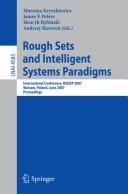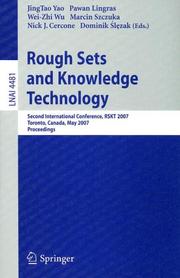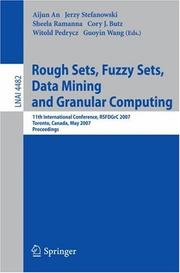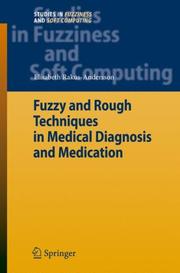| Listing 1 - 6 of 6 |
Sort by
|

ISBN: 9783540734505 3540734503 3540734511 Year: 2007 Publisher: Berlin, Germany ; New York, New York : Springer,
Abstract | Keywords | Export | Availability | Bookmark
 Loading...
Loading...Choose an application
- Reference Manager
- EndNote
- RefWorks (Direct export to RefWorks)
Soft computing --- Rough sets --- Fuzzy sets --- Intelligent control systems --- Informatique douce --- Ensembles approximatifs --- Ensembles flous --- Commande intelligente --- Congresses. --- Congrès --- Computer Science --- Mechanical Engineering - General --- Mechanical Engineering --- Engineering & Applied Sciences --- Information Technology --- Artificial Intelligence --- Rough set theory --- Theory of rough sets --- Computer science. --- Computers. --- Mathematical logic. --- Database management. --- Data mining. --- Artificial intelligence. --- Pattern recognition. --- Computer Science. --- Artificial Intelligence (incl. Robotics). --- Mathematical Logic and Formal Languages. --- Data Mining and Knowledge Discovery. --- Database Management. --- Computation by Abstract Devices. --- Pattern Recognition. --- Design perception --- Pattern recognition --- Form perception --- Perception --- Figure-ground perception --- AI (Artificial intelligence) --- Artificial thinking --- Electronic brains --- Intellectronics --- Intelligence, Artificial --- Intelligent machines --- Machine intelligence --- Thinking, Artificial --- Bionics --- Cognitive science --- Digital computer simulation --- Electronic data processing --- Logic machines --- Machine theory --- Self-organizing systems --- Simulation methods --- Fifth generation computers --- Neural computers --- Algorithmic knowledge discovery --- Factual data analysis --- KDD (Information retrieval) --- Knowledge discovery in data --- Knowledge discovery in databases --- Mining, Data --- Database searching --- Data base management --- Data services (Database management) --- Database management services --- DBMS (Computer science) --- Generalized data management systems --- Services, Database management --- Systems, Database management --- Systems, Generalized database management --- Algebra of logic --- Logic, Universal --- Mathematical logic --- Symbolic and mathematical logic --- Symbolic logic --- Mathematics --- Algebra, Abstract --- Metamathematics --- Set theory --- Syllogism --- Automatic computers --- Automatic data processors --- Computer hardware --- Computing machines (Computers) --- Electronic calculating-machines --- Electronic computers --- Hardware, Computer --- Computer systems --- Cybernetics --- Calculators --- Cyberspace --- Informatics --- Science --- Optical pattern recognition. --- Artificial Intelligence. --- Optical data processing --- Pattern perception --- Perceptrons --- Visual discrimination

ISBN: 9783540724575 3540724575 9786610949366 1280949368 3540724583 Year: 2007 Publisher: Berlin ; Heidelberg : Springer-Verlag,
Abstract | Keywords | Export | Availability | Bookmark
 Loading...
Loading...Choose an application
- Reference Manager
- EndNote
- RefWorks (Direct export to RefWorks)
Soft computing --- Rough sets --- Data mining --- Artificial intelligence --- Informatique douce --- Ensembles approximatifs --- Exploration de données (Informatique) --- Intelligence artificielle --- Congresses. --- Congrès --- Artificial intelligence -- Congresses. --- Data mining -- Congresses. --- Rough sets -- Congresses. --- Soft computing -- Congresses. --- Computer Science --- Mechanical Engineering - General --- Engineering & Applied Sciences --- Mechanical Engineering --- Information Technology --- Artificial Intelligence --- Rough set theory --- Theory of rough sets --- Computer science. --- Computers. --- Mathematical logic. --- Database management. --- Data mining. --- Artificial intelligence. --- Pattern recognition. --- Computer Science. --- Artificial Intelligence (incl. Robotics). --- Data Mining and Knowledge Discovery. --- Database Management. --- Mathematical Logic and Formal Languages. --- Computation by Abstract Devices. --- Pattern Recognition. --- Design perception --- Pattern recognition --- Form perception --- Perception --- Figure-ground perception --- AI (Artificial intelligence) --- Artificial thinking --- Electronic brains --- Intellectronics --- Intelligence, Artificial --- Intelligent machines --- Machine intelligence --- Thinking, Artificial --- Bionics --- Cognitive science --- Digital computer simulation --- Electronic data processing --- Logic machines --- Machine theory --- Self-organizing systems --- Simulation methods --- Fifth generation computers --- Neural computers --- Algorithmic knowledge discovery --- Factual data analysis --- KDD (Information retrieval) --- Knowledge discovery in data --- Knowledge discovery in databases --- Mining, Data --- Database searching --- Data base management --- Data services (Database management) --- Database management services --- DBMS (Computer science) --- Generalized data management systems --- Services, Database management --- Systems, Database management --- Systems, Generalized database management --- Algebra of logic --- Logic, Universal --- Mathematical logic --- Symbolic and mathematical logic --- Symbolic logic --- Mathematics --- Algebra, Abstract --- Metamathematics --- Set theory --- Syllogism --- Automatic computers --- Automatic data processors --- Computer hardware --- Computing machines (Computers) --- Electronic calculating-machines --- Electronic computers --- Hardware, Computer --- Computer systems --- Cybernetics --- Calculators --- Cyberspace --- Informatics --- Science --- Optical pattern recognition. --- Artificial Intelligence. --- Optical data processing --- Pattern perception --- Perceptrons --- Visual discrimination


ISBN: 9783540725299 3540725296 354072530X Year: 2007 Publisher: Berlin, Heidelberg : Springer Berlin Heidelberg : Imprint: Springer,
Abstract | Keywords | Export | Availability | Bookmark
 Loading...
Loading...Choose an application
- Reference Manager
- EndNote
- RefWorks (Direct export to RefWorks)
This volume contains the papers selected for presentation at the 11th Int- national Conference on Rough Sets, Fuzzy Sets, Data Mining, and Granular Computing (RSFDGrC 2007), a part of the Joint Rough Set Symposium (JRS 2007) organized by Infobright Inc. and York University. JRS 2007 was held for the ?rst time during May 14–16, 2007 in MaRS Discovery District, Toronto, Canada. It consisted of two conferences: RSFDGrC 2007 and the Second Int- national Conference on Rough Sets and Knowledge Technology (RSKT 2007). The two conferences that constituted JRS 2007 investigated rough sets as an emerging methodology established more than 25 years ago by Zdzis law Pawlak. Roughsettheoryhasbecomeanintegralpartofdiversehybridresearchstreams. In keeping with this trend, JRS 2007 encompassed rough and fuzzy sets, kno- edgetechnologyanddiscovery,softandgranularcomputing,dataprocessingand mining, while maintaining an emphasis on foundations and applications. RSFDGrC 2007 followed in the footsteps of well-established international initiatives devoted to the dissemination of rough sets research, held so far in Canada, China, Japan, Poland, Sweden, and the USA. RSFDGrC was ?rst - ganized as the 7th International Workshop on Rough Sets, Data Mining and Granular Computing held in Yamaguchi, Japan in 1999. Its key feature was to stress the role of integrating intelligent information methods to solve real-world, large, complex problems concerned with uncertainty and fuzziness. RSFDGrC achieved the status of a bi-annual international conference, starting from 2003 in Chongqing, China.
Computer science --- Fuzzy sets --- Data mining --- Soft computing --- Informatique --- Ensembles flous --- Exploration de données (Informatique) --- Informatique douce --- Congresses. --- Congrès --- Rough sets --- Granular computing --- Computer Science --- Mechanical Engineering - General --- Engineering & Applied Sciences --- Mechanical Engineering --- Information Technology --- Artificial Intelligence --- Rough set theory --- Theory of rough sets --- GC (Computer science) --- Computer science. --- Computers. --- Mathematical logic. --- Database management. --- Data mining. --- Artificial intelligence. --- Computer Science. --- Theory of Computation. --- Artificial Intelligence (incl. Robotics). --- Data Mining and Knowledge Discovery. --- Database Management. --- Mathematical Logic and Formal Languages. --- Computation by Abstract Devices. --- AI (Artificial intelligence) --- Artificial thinking --- Electronic brains --- Intellectronics --- Intelligence, Artificial --- Intelligent machines --- Machine intelligence --- Thinking, Artificial --- Bionics --- Cognitive science --- Digital computer simulation --- Electronic data processing --- Logic machines --- Machine theory --- Self-organizing systems --- Simulation methods --- Fifth generation computers --- Neural computers --- Algorithmic knowledge discovery --- Factual data analysis --- KDD (Information retrieval) --- Knowledge discovery in data --- Knowledge discovery in databases --- Mining, Data --- Database searching --- Data base management --- Data services (Database management) --- Database management services --- DBMS (Computer science) --- Generalized data management systems --- Services, Database management --- Systems, Database management --- Systems, Generalized database management --- Algebra of logic --- Logic, Universal --- Mathematical logic --- Symbolic and mathematical logic --- Symbolic logic --- Mathematics --- Algebra, Abstract --- Metamathematics --- Set theory --- Syllogism --- Automatic computers --- Automatic data processors --- Computer hardware --- Computing machines (Computers) --- Electronic calculating-machines --- Electronic computers --- Hardware, Computer --- Computer systems --- Cybernetics --- Calculators --- Cyberspace --- Informatics --- Science --- Information theory. --- Artificial Intelligence. --- Communication theory --- Communication

ISBN: 9783540497073 3540497072 9786610938483 128093848X 3540497080 Year: 2007 Volume: v. 212 Publisher: Berlin, Germany ; New York, United States : Springer,
Abstract | Keywords | Export | Availability | Bookmark
 Loading...
Loading...Choose an application
- Reference Manager
- EndNote
- RefWorks (Direct export to RefWorks)
This volume provides readers with selected fuzzy and rough tools used to medical tasks, especially diagnosing and medication. To build a link between theoretical, mathematical excerpts and practical medical applications, the contents is formed as a sequence of occurrences in which a patient appears to be diagnosed and cured. The fuzzy and rough elements are inserted in the book in the order required by the presentation of medical substance to maintain the logical unity of the book’s essence. In conformity with this pattern the essay presents in turn some necessary elements of fuzzy set theory, the classical fuzzy diagnostic model with extensions, the fuzzy diagnostic model with clinical examinations extended throughout time based on distance theory, methods of drug effectiveness measurements and algorithms selecting the optimal medicine. As the complement, the solution of an approximation problem is suggested to find a curve that surrounds two-dimensional clock-like point sets with the little approximation error. A lot of appealing examples are added to facilitate comprehension of theoretical principles for a reader, so that even a beginner in fuzzy set theory can follow calculation steps without implementing computer programs. It should be emphasized that all models are also applicable to other fields, especially to technical domains after necessary adaptations. This confirms the existence of the large spectrum of applicable fuzzy and rough methods not only in medicine but also in natural sciences.
Mathematics --- Medicine --- Fuzzy sets --- Rough sets --- Médecine --- Ensembles flous --- Ensembles approximatifs --- diagnostic use --- therapeutic use --- Mathématiques --- Fuzzy sets. --- Medicine -- Mathematics. --- Rough sets. --- Logic --- Models, Theoretical --- Analytical, Diagnostic and Therapeutic Techniques and Equipment --- Artificial Intelligence --- Chemicals and Drugs --- Philosophy --- Computing Methodologies --- Investigative Techniques --- Humanities --- Information Science --- Fuzzy Logic --- Diagnosis --- Pharmaceutical Preparations --- Civil & Environmental Engineering --- Engineering & Applied Sciences --- Health & Biological Sciences --- Applied Mathematics --- Medical Research --- Civil Engineering --- Medical & Biomedical Informatics --- Mathematics. --- Rough set theory --- Theory of rough sets --- Sets, Fuzzy --- Medical mathematics --- Medicine. --- Pharmacology. --- Internal medicine. --- Artificial intelligence. --- Applied mathematics. --- Engineering mathematics. --- Medicine & Public Health. --- Internal Medicine. --- Pharmacology/Toxicology. --- Appl.Mathematics/Computational Methods of Engineering. --- Artificial Intelligence (incl. Robotics). --- Set theory --- Fuzzy mathematics --- Toxicology. --- Mathematical and Computational Engineering. --- Artificial Intelligence. --- AI (Artificial intelligence) --- Artificial thinking --- Electronic brains --- Intellectronics --- Intelligence, Artificial --- Intelligent machines --- Machine intelligence --- Thinking, Artificial --- Bionics --- Cognitive science --- Digital computer simulation --- Electronic data processing --- Logic machines --- Machine theory --- Self-organizing systems --- Simulation methods --- Fifth generation computers --- Neural computers --- Engineering --- Engineering analysis --- Mathematical analysis --- Chemicals --- Pharmacology --- Poisoning --- Poisons --- Medicine, Internal --- Toxicology --- Drug effects --- Medical pharmacology --- Medical sciences --- Chemotherapy --- Drugs --- Pharmacy --- Physiological effect --- Health Workforce

ISBN: 9783540711988 3540711988 9786610902231 128090223X 3540712003 Year: 2007 Publisher: Berlin, Heidelberg : Springer Berlin Heidelberg : Imprint: Springer,
Abstract | Keywords | Export | Availability | Bookmark
 Loading...
Loading...Choose an application
- Reference Manager
- EndNote
- RefWorks (Direct export to RefWorks)
Rough sets. --- Set theory. --- Artificial intelligence. --- Electronic data processing. --- Ensembles approximatifs --- Théorie des ensembles --- Intelligence artificielle --- Informatique --- Pawlak, Zdzislaw. --- Algebra --- Mathematical Theory --- Mathematics --- Physical Sciences & Mathematics --- Aggregates --- Classes (Mathematics) --- Ensembles (Mathematics) --- Mathematical sets --- Sets (Mathematics) --- Theory of sets --- Rough set theory --- Theory of rough sets --- Computer science. --- Computers. --- Mathematical logic. --- Database management. --- Data mining. --- Computer Science. --- Artificial Intelligence (incl. Robotics). --- Data Mining and Knowledge Discovery. --- Theory of Computation. --- Mathematical Logic and Formal Languages. --- Computation by Abstract Devices. --- Database Management. --- AI (Artificial intelligence) --- Artificial thinking --- Electronic brains --- Intellectronics --- Intelligence, Artificial --- Intelligent machines --- Machine intelligence --- Thinking, Artificial --- Bionics --- Cognitive science --- Digital computer simulation --- Electronic data processing --- Logic machines --- Machine theory --- Self-organizing systems --- Simulation methods --- Fifth generation computers --- Neural computers --- Algorithmic knowledge discovery --- Factual data analysis --- KDD (Information retrieval) --- Knowledge discovery in data --- Knowledge discovery in databases --- Mining, Data --- Database searching --- Data base management --- Data services (Database management) --- Database management services --- DBMS (Computer science) --- Generalized data management systems --- Services, Database management --- Systems, Database management --- Systems, Generalized database management --- Algebra of logic --- Logic, Universal --- Mathematical logic --- Symbolic and mathematical logic --- Symbolic logic --- Algebra, Abstract --- Metamathematics --- Set theory --- Syllogism --- Automatic computers --- Automatic data processors --- Computer hardware --- Computing machines (Computers) --- Electronic calculating-machines --- Electronic computers --- Hardware, Computer --- Computer systems --- Cybernetics --- Calculators --- Cyberspace --- Informatics --- Science --- Logic, Symbolic and mathematical --- Information theory. --- Artificial Intelligence. --- Communication theory --- Communication

ISBN: 9783540716624 3540716629 9786610901708 1280901705 3540716637 Year: 2007 Publisher: Berlin, Heidelberg : Springer,
Abstract | Keywords | Export | Availability | Bookmark
 Loading...
Loading...Choose an application
- Reference Manager
- EndNote
- RefWorks (Direct export to RefWorks)
Rough sets. --- Set theory. --- Artificial intelligence. --- Ensembles approximatifs --- Théorie des ensembles --- Intelligence artificielle --- Pawlak, Zdzislaw. --- Electronic books. -- local. --- Electronic data processing. --- Pawlak, Zdzisław. --- Mathematical Theory --- Computer Science --- Engineering & Applied Sciences --- Mathematics --- Physical Sciences & Mathematics --- ADP (Data processing) --- Automatic data processing --- Data processing --- EDP (Data processing) --- IDP (Data processing) --- Integrated data processing --- AI (Artificial intelligence) --- Artificial thinking --- Electronic brains --- Intellectronics --- Intelligence, Artificial --- Intelligent machines --- Machine intelligence --- Thinking, Artificial --- Aggregates --- Classes (Mathematics) --- Ensembles (Mathematics) --- Mathematical sets --- Sets (Mathematics) --- Theory of sets --- Rough set theory --- Theory of rough sets --- Computer science. --- Computers. --- Mathematical logic. --- Database management. --- Image processing. --- Computer Science. --- Artificial Intelligence (incl. Robotics). --- Mathematical Logic and Formal Languages. --- Computation by Abstract Devices. --- Database Management. --- Image Processing and Computer Vision. --- Bionics --- Cognitive science --- Digital computer simulation --- Electronic data processing --- Logic machines --- Machine theory --- Self-organizing systems --- Simulation methods --- Fifth generation computers --- Neural computers --- Pictorial data processing --- Picture processing --- Processing, Image --- Imaging systems --- Optical data processing --- Data base management --- Data services (Database management) --- Database management services --- DBMS (Computer science) --- Generalized data management systems --- Services, Database management --- Systems, Database management --- Systems, Generalized database management --- Algebra of logic --- Logic, Universal --- Mathematical logic --- Symbolic and mathematical logic --- Symbolic logic --- Algebra, Abstract --- Metamathematics --- Set theory --- Syllogism --- Automatic computers --- Automatic data processors --- Computer hardware --- Computing machines (Computers) --- Electronic calculating-machines --- Electronic computers --- Hardware, Computer --- Computer systems --- Cybernetics --- Calculators --- Cyberspace --- Informatics --- Science --- Computers --- Office practice --- Logic, Symbolic and mathematical --- Automation --- Computer vision. --- Artificial Intelligence. --- Machine vision --- Vision, Computer --- Artificial intelligence --- Image processing --- Pattern recognition systems --- Optical data processing. --- Optical computing --- Visual data processing --- Integrated optics --- Photonics --- Optical equipment
| Listing 1 - 6 of 6 |
Sort by
|

 Search
Search Feedback
Feedback About UniCat
About UniCat  Help
Help News
News